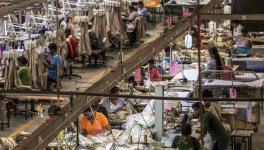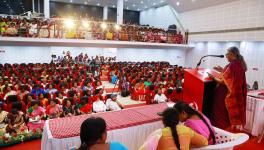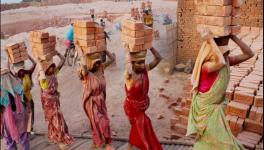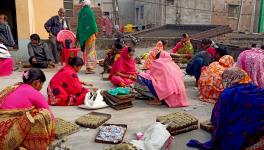Women Workers in Garment Industry Among Worst Hit by COVID-19: ILO
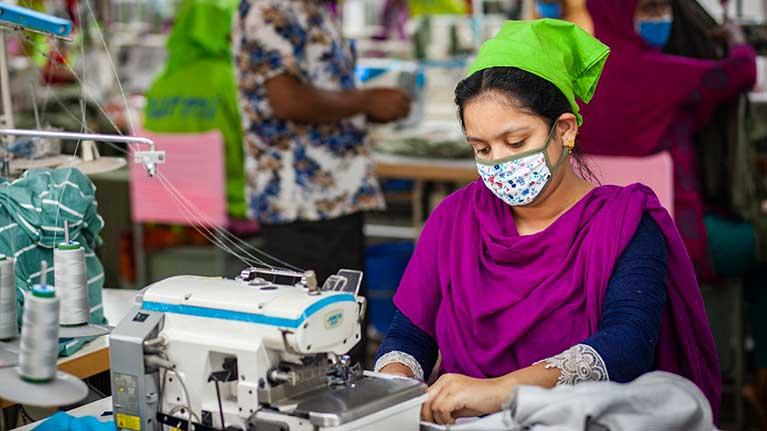
Representational Image. Image Courtesy: ILO
A recently released brief from the International Labour Organisation listing the impact of COVID-19 on women in the garment industry stated that women have suffered worse due to underlying challenges including discrimination and harassment, underrepresentation of women’s voice, wage gaps as well as unevenly shared unpaid care and family obligations.
The report titled, Gendered Impacts of COVID-19 on the Garment Sector, outlines how the pandemic has impact women and men workers in the garment sector, where women workers are over-represented.
“Women account for approximately 80% of the garment sector workforce, so they are heavily affected to start with by many of the impacts of the COVID-19 pandemic. However, women also experience additional impacts due to the existing challenges they face in the workplace as well as expectations regarding women’s obligations in the home,” said Joni Simpson, Senior Gender Specialist for the ILO’s Regional Office for Asia and the Pacific, according to press release by the ILO.
Developed by the ILO-Sida Decent Work in Garment Supply Chains Asia project and the ILO-IFC Better Work programme, the report states that the imports by major buying countries from the garment-exporting countries in Asia—which employed an estimated 65 million workers (75% of total workforce) in 2019—had dropped by up to 70% in the first half of 2020, due to COVID-19. This is accompanied by a subsequent increase in workers’ layoffs and dismissals, while factories which have managed to reopen are now are operating at reduced workforce capacity.
Commenting on the workers’ layoffs, the report states, “As buyers and suppliers struggled to mitigate the economic repercussions of the coronavirus, and orders worth billions of dollars were cancelled, millions of workers in countries such as Bangladesh, Cambodia, Egypt, Ethiopia, Haiti and more were retrenched or furloughed, some without payment of wages for already completed work or severance pay, as required by law.”
The report lists lack of access to basic necessities as one among the short term impacts of the crisis on women workers, stating that while both women and men workers face the risk of economic insecurity in such situations, the women workers’ insecurity “may be compounded by their unequal access to government and financial services”.
Further, the retrenchment criteria which include “contractual status, years of service, performance, qualifications and absence records, may perpetuate discriminatory practices, resulting in dismissals that disproportionately impact women workers”. This in turn may result in a rise in women’s share of employment in the informal economy, since informal work arrangements in low- and lower-middle income countries are more prevalent among women than among men.
Also read: Karnataka: Garment Workers’ Protest at Gokaldas Exports Unit Enters 24th Day
Not only that, increased unpaid care work resulting from lockdowns induced by the pandemic as well as the risk of the disease, lead to delays in “return of women workers to work, and could lead to them dropping out of the labour force altogether, thereby affecting the supply of women’s labour”. As per an earlier ILO research, care work was already the largest factor keeping women out of the workforce prior to increases due to the COVID19 pandemic.
There is also an increased risk of gender-based violence, which is often found to be directed at women, exacerbated by the heightened tensions resulting from economic insecurity and limitations in mobility; male unemployment backlash; and a loss of bargaining power and status at home due to decreased earnings.
Highlighting the existing representation gaps in policy- and decision-making forums, the brief states that this may intensify, as is visible from the underrepresentation of women leaders in COVID-19 response committees and decision-making spaces.
Also, with many competing factories closed due to COVID-19, it has minimised workers’ abilities to seek other employment options, which could lead to increasing instances of harassment, it states. The women workers are also susceptible to adverse health outcomes due to the reduced access to sexual and reproductive health (SRH) services, as “during health emergencies, public and financial resources often shift away from non-epidemic health services (UNFPA 2020a)”. This, the brief adds, could affect the maternal health for workers, most of whom are of child-rearing age, who may not be able to access pre-natal and neo-natal care.
Talking about the recommendations to be followed, Jessica Wan, a Better Work Gender Specialist, said, “It is crucial that governments, businesses and other stakeholders understand the multi-dimensional impacts of the COVID-19 pandemic on both women and men workers, and design policies that enable a smart, sustainable and gender-responsive recovery. Otherwise, the COVID-19 crisis threatens to exacerbate pre-existing inequalities and will hamper the social and economic sustainability of the garment sector.”
Among the recommendations suggested in the brief are a greater focus on retrenchment and closure practices as well as addressing women’s disproportionate unpaid care obligations so they can return to work as factories resume operations. The brief also highlights the importance of strengthening efforts to combat violence and harassment in the workplace, in view of emerging data showing that COVID-19 has increased the risks of gender-based violence. In addition, the need to ensure women’s voice, representation and leadership in dialogue and decision-making is also seen as key to ensuring a full and fair recovery from the pandemic.
Get the latest reports & analysis with people's perspective on Protests, movements & deep analytical videos, discussions of the current affairs in your Telegram app. Subscribe to NewsClick's Telegram channel & get Real-Time updates on stories, as they get published on our website.











